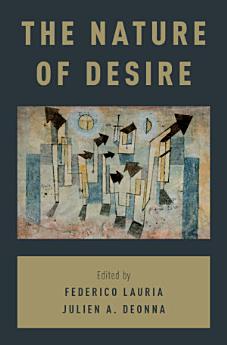The Nature of Desire
Federico Lauria · Julien A. Deonna
Jun 2017 · Oxford University Press
I-Ebook
336
Amakhasi
family_home
Kufanelekile
info
reportIzilinganiso nezibuyekezo aziqinisekisiwe Funda Kabanzi
Mayelana nale ebook
Desires matter. What are desires? Many believe that desire is a motivational state: desiring is being disposed to act. This conception aligns with the functionalist approach to desire and the standard account of desire's role in explaining action. According to a second influential approach, however, desire is first and foremost an evaluation: desiring is representing something as good. After all, we seem to desire things under the guise of the good. Which understanding of desire is more accurate? Is the guise of the good even right to assume? Should we adopt an alternative picture that emphasizes desire's deontic nature? What do neuroscientific studies suggest? Essays in the first section of the volume are devoted to these questions, and to the puzzle of desire's essence. In the second part of the volume, essays investigate some implications that the various conceptions of desire have on a number of fundamental issues. For example, why are inconsistent desires problematic? What is desire's role in practical deliberation? How do we know what we want? This volume will contribute to the emergence of a fruitful debate on a neglected, albeit crucial, dimension of the mind.
Mayelana nomlobi
Federico Lauria is a post-doctoral researcher at the Philosophy Department and Swiss Center for Affective Sciences of the University of Geneva and Visiting Scholar at New York University. He was recently Associate Researcher at Columbia University. His work is at the intersection of philosophy of mind, ethics, and aesthetics. More specifically, he is interested in issues in philosophy of desire and emotions, such as self-deception, musical emotions, and epistemic emotions, among others. Julien A. Deonna is associate professor in philosophy at the University of Geneva and project leader at CISA, the Swiss Centre for Affective Sciences. His research interests are in the philosophy of mind, in particular the philosophy of emotions, moral emotions and moral psychology. In addition to many articles in the area, he is the co-author of In Defense of Shame (OUP, 2011) and The Emotions: a Philosophical Introduction (Routledge, 2012). He is the co-director of Thumos, the Genevan philosophy research group on emotions, values and norms.
Nikeza le ebook isilinganiso
Sitshele ukuthi ucabangani.
Ulwazi lokufunda
Amasmathifoni namathebulethi
Faka uhlelo lokusebenza lwe-Google Play Amabhuku lwe-Android ne-iPad/iPhone. Livunyelaniswa ngokuzenzakalela ne-akhawunti yakho liphinde likuvumele ukuthi ufunde uxhunywe ku-inthanethi noma ungaxhunyiwe noma ngabe ukuphi.
Amakhompyutha aphathekayo namakhompyutha
Ungalalela ama-audiobook athengwe ku-Google Play usebenzisa isiphequluli sewebhu sekhompuyutha yakho.
Ama-eReaders namanye amadivayisi
Ukuze ufunde kumadivayisi e-e-ink afana ne-Kobo eReaders, uzodinga ukudawuniloda ifayela futhi ulidlulisele kudivayisi yakho. Landela imiyalelo Yesikhungo Sosizo eningiliziwe ukuze udlulise amafayela kuma-eReader asekelwayo.





